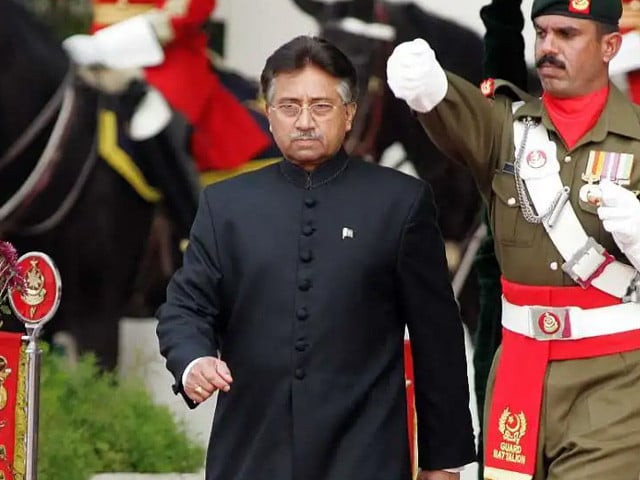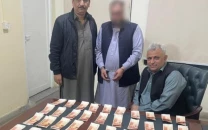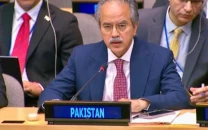SC upholds Musharraf's death penalty in treason case
SC annuls LHC’s 2020 decision declaring special court ‘unconstitutional’

In a symbolic order, the Supreme Court on Wednesday upheld the death sentence handed down to the late former military ruler, Gen (retd) Pervez Musharraf, by a special court in a high treason case.
A four-judge bench of the apex court, headed by Chief Justice of Pakistan Qazi Faez Isa, and comprising Justices Syed Mansoor Ali Shah, Aminuddin Khan and Athar Minallah, took up appeals related to the Lahore High Court’s January 13, 2020 order.
The LHC in its order declared the special court, which handed down the death sentence to Musharraf on December 17, 2019, as “unconstitutional”.
The SC issued separate orders on the matter of the appeal against the death penalty decision and the petition filed against the LHC declaring the special court ‘illegal’.
In one of the orders, the SC dismissed the appeal under Section 431 of the Criminal Code because of the lack of appearance of the legal heirs of Musharraf.
It declared that as a result of the termination of the appeal, the death sentence handed down by the special court in the high treason case would remain upheld.
The court observed that the former general’s legal heirs could not be contacted despite making efforts.
According to the SC’s order, notices were given to Musharraf’s heirs regarding the court proceedings at both their local and international residential addresses. Advertisements were also released in Urdu and English newspapers.
The SC noted in its order that there were two questions before the court: whether or not an appeal could be heard after the person had passed away, and if the death penalty was upheld, would Musharraf's legal heirs be entitled to his benefits.
The decision further stated that despite several attempts, Musharraf's heirs could not be contacted. “We have no option but to retain the death penalty,” the order read.
In the other matter, the court issued a short order annulling the LHC decision to declare the special court as unconstitutional.
During the proceedings, Additional Attorney General Aamir Rehman told the court that the government opposed Musharraf's appeal.
Hamid Khan and Salman Safdar, the lawyers for Musharraf, appeared before the court.
Hamid asserted that the request before the SC aimed to overturn the LHC order was a "constitutional matter” and his client’s "criminal appeal" should be considered separately.
Addressing Hamid, CJP Isa observed that he had completed his arguments in the constitutional matter and the court had to hear the criminal appeal.
“These are two separate matters and both have to be decided separately,” he added.
Safdar said in his arguments that there were no instructions from the former military ruler’s family.
He added that the family was aware of the case, further informing the court that they were contacted over 10 times since November last year.
“No instructions were given for, or against the case. Hence, I am not representing Pervez Musharraf's family,” he continued.
Justice Shah observed that the SC had also issued notices to Musharraf directly, to which Safdar added that the top court had also notified him through a newspaper advertisement.
“I can provide judicial assistance on two situations,” the lawyer said. To this, Justice Shah told Safdar that he could assist the court only on the legal situation.
Justice Aminuddin noted that the crucial question in this case was that Musharraf never surrendered himself before the court.
CJP Isa observed that that a way could be worked out for Musharraf not surrendering before the court as he was abroad and sick.
He continued that the real question was that none of his legal heirs appeared before the court either.
Justice Athar Minallah remarked that under Article 12, the court’s doors were open against everyone involved in imposing the emergency with Musharraf. To this, Safdar responded that the ex-military ruler was not involved in the act alone.
“The then prime minister, law minister, parliament and SC judges were also involved in it with him,” he said, adding that the special court sentenced Musharraf without hearing him.
“One man was singled out and punished for his actions against the whole country,” he argued.
Following this, the CJP called for taking a five-minute break, stating that the apex court wished to decide the case today.
As the hearing resumed, CJP Isa observed that the court could not hear the ex-military dictator’s lawyer in the absence of his legal heirs.
“Decisions should not be based on assumptions,” he observed, adding that the court did not want to close any door on the heirs.
“How can the court resort to the use of 561-A?” he questioned.
Appreciating the action taken by the SC, Safdar informed that Musharraf's heirs did not reside in Pakistan.
The CJP asked Safdar what his reservations were over the LHC.
To which the lawyer said that he does not even appear in the SC before the judge, who tried Musharraf in the LHC.
“I will definitely make some reports in your chamber about this,” Safdar said. However, he was discouraged by the CJP, who pointed out that they did not call anyone in the chamber.


















COMMENTS
Comments are moderated and generally will be posted if they are on-topic and not abusive.
For more information, please see our Comments FAQ